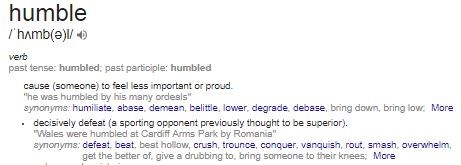I wrote a post recently explaining why I thought media spokespeople should stop using the word ‘excited’ in media interviews.
And it seemed to strike a chord with a lot of you.
The responses we received were interesting, not just because of the number of people agreeing that the use of ‘excitement’ has left them underwhelmed, but also because of the additional words readers would like to see blacklisted from media interviews.
And I thought it would be great to share some of these suggestions.
So, I am really excited (sorry, couldn’t resist) to present…
Humbled
This is a word that has been on my radar for a while, partly because everyone appears to be ‘humbled’ at the moment and also because the majority of people who use it are completely misusing it.
It is a word sports stars, politicians and film stars appear particularly fond of.

Just last week Canadian Soccer President Steve Reed said the organisation was ‘very humbled’ to win the bid to host the World Cup in 2026 alongside USA and Mexico, which is pretty odd because really he is saying the organisation feels embarrassed and defeated.
Of course, what he actually means is ‘honoured’ because he is describing something that his organisation surely feels proud about, even if Canada and the US don’t appear to be getting on too well currently.
Losing that World Cup bid, on the other hand, would have potentially been a humbling experience.
But Mr Rees is far from being alone in his misuse of this word. Hilary Clinton once said in a speech that she was ‘very proud and very humbled’, which is pretty much impossible at the same time.
More recently, the Labour party’s Janet Daby told reporters she felt ‘humbled and delighted’ to win the Lewisham Easy by-election – the word you are looking for Janet is ‘honoured’.
I’ve two theories about this misuse of vocabulary. One is that media spokespeople have heard others say it in interviews and thought that it sounded good without really understanding the meaning.
The other is that people, particularly the rich and famous want to be seen as being humble.
If media spokespeople are going to use this overused word, they should at least use it in the right context.
Passionate
This is very similar to spokespeople saying how ‘excited’ they are.
It sounds incredibly scripted, like a press release is just being read aloud, and frankly, it also sounds false if the issue they are discussing is pretty bland.
Do you believe it when a spokesperson says ‘we are passionate about customer service?’
We want to see spokespeople who are passionate, but that passion should come through from the way they discuss the subject and the examples they use to support their messages, not because they tell us they are.
‘Show not tell’, as one of our expert current working journalist tutors might say on one of our media training courses.
Talk of passion is probably best left to the bedroom.
‘We are pleased to announce that’
This is another one of those expressions found in bad press releases which sometimes makes their way into media interviews.
Again, there is the issue of it making the interview sound scripted, but it is also completely pointless.
I think it is fair to assume that if an organisation is issuing a press release, or giving interviews, about a new service or product, they are pleased to be making that announcement – we don’t need it spelled out.
News outlets aren’t going to use quotes or sound bites of spokespeople telling us how pleased they are to make an announcement. They will use quotes that show why and how what you are announcing should matter to their audience.
Reach out
Unless you are a member of the Four Tops, there is absolutely no reason to utter the phrase ‘reach out’.
It is an example of the horrible boardroom language which all too often finds its way into media interviews.
The quickest of Google searches will show that spokespeople who use this phrase are widely derided, yet it continues to be used. Fortunately, the English language offers some much better alternatives, such as ‘contact’ and ‘appeal’.
Leveraging our synergies
If you thought that the words ‘leveraging’ and ‘synergy’ were painful, imagine the horror of combining them together in one sentence.
I don’t know if it is possible to leverage synergies, in fact, I’m not sure what it means at all.
And that is the point. If people can’t follow what a spokesperson is saying they will switch off and the opportunity a media interview presents will be lost.
‘That’s a great question’
This is an interesting one. If it is used sparingly, it can be an effective way for a spokesperson to buy themselves a little thinking time before responding to a difficult question. But when it is used repeatedly it can become one of those distractions, a bit like starting every response with ‘so’, which can irritate audiences. It can also, in the words of one of the commentators on the ‘excited’ blog, sound like a bit of a ‘suck up’.
For more examples of words and phrases to avoid in media interviews, take a look at these blogs:
The words and phrases journalists love to hate
Nine phrases you must avoid in your next media interview
Media First are media and communications training specialists with over 30 years of experience. We have a team of trainers, each with decades of experience working as journalists, presenters, communications coaches and media trainers.
Click here to find out more about our journalist-led media training courses.


